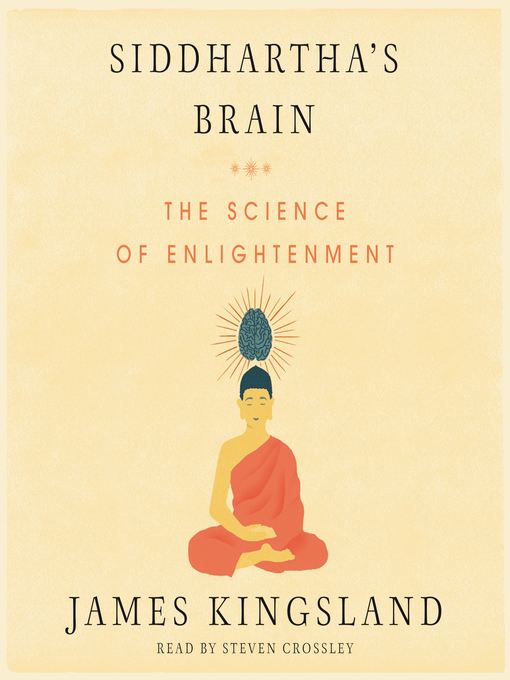
Siddhartha's Brain
Unlocking the Ancient Science of Enlightenment
کتاب های مرتبط
- اطلاعات
- نقد و بررسی
- دیدگاه کاربران
نقد و بررسی

This audiobook is chock-full of scientific experiments proving that the Buddhist state of enlightenment founded by Siddhartha Gautama, the Buddha, works just as well as antidepressants to alleviate suffering from mental illness, addiction, and anxiety. Narrator Steven Crossley has the unenviable task of making clear both Siddhartha's history of perfecting enlightenment and the contemporary scientific experiments that show a statistically significant improvement for people with specific illnesses after they practice enlightenment, now reborn as mindfulness. Crossley delivers the material with aplomb. However, as illuminating as this audiobook may be, the average listener may find the depth of the scientific data to be daunting. One's own enlightenment might be better achieved by listening to less theory and more methodology. E.E.S � AudioFile 2016, Portland, Maine

March 14, 2016
Guardian science editor Kingsland presents a fascinating exploration of the studies of enlightenmentâwhere the experience of meditative spiritual practice meets the rigors of scientific research. Kingsland suggests that the ubiquitous presence of psychiatric illnesses may be alternatively understood as an "extreme manifestation of ordinary human condition," and if this is the case, the practice of meditation should (in theory) alleviate afflictions caused by a mental apparatus gone haywire. To fix the errant mental system, Buddhism prescribes meditation: one pays attention to the breath, practices non-judgmental awareness, and calmly observes the landscape of thoughts. Kingsland skillfully dives in and out of various subjectsâthe neurological relaxation response to meditation, the difference between pain and suffering, emotional regulationâand effectively paints a neurological picture of the mind without devaluing Buddhism's spiritual image of cognition. Science shows that meditation reworks neurological networks to better regulate and manage the emotions; in short, being a good, contented human being is a skill that can be learned. Based on this idea, Kingsland offers guided practices at the end of every chapter, ranging from attention to the breath to metta (loving-kindness) meditations. Kingsland's book is a cursory but fascinating exploration of the neuroscience behind meditation, and he offers a wonderful starting point for further research and practice.

Starred review from April 1, 2016
In this work, Kingsland (science editor, Guardian) expertly weaves the story and teachings of the Buddha with clinical and scientific research to engage in a highly readable examination of the benefits of mindfulness and meditation. The author applies Buddhism and science to illustrate how humans' complex "neural machinery" hardwires us for suffering. With chapters devoted to the discussion of depression, chronic pain, and addiction, he employs case studies to highlight the effectiveness of various mindfulness-based therapies, although he doesn't shy away from presenting the challenges to and limitations of those investigations. While intended for a lay audience, the work adeptly incorporates Buddhist and scientific terminology in such a way that concepts are easily understood through the context of the narrative. Several guided meditations are included to provide readers an opportunity to try the practices discussed. VERDICT Both skeptics and believers of the mental and physical benefits of mindfulness and meditation will find this to be a satisfying read. Those who are struggling with their own form of suffering might also appreciate the discussion of alternative therapies.--Amanda Folk, Univ. of Pittsburgh Lib., Greensburg
Copyright 2016 Library Journal, LLC Used with permission.

March 1, 2016
A Guardian science editor and self-proclaimed skeptic analyzes "the ancient science of enlightenment." Some 2,500 years ago, Siddhartha Gautama abandoned his princely life to follow an ascetic path in search of spiritual truths. Kingsland explores the history and science of mindfulness with the story of Siddhartha, the Buddha, as a backdrop. Tracing Western scientific research on the subject of meditation from the 1960s to the present day, the author details studies demonstrating the efficacy of mindfulness in battling chronic pain, mental illness, addiction, and even aging while emphasizing that the benefits of mindfulness have been enjoyed for centuries without the help of modern science. Positing that the first humans to learn to quiet their minds at will may have been hunter-gatherers staring into the flames of their fires at night, Kingsland draws attention to the ubiquity of meditative practices with examples from the world's major religions, noting Buddhism as being exceptional for having removed supernatural beings from the equation. Juxtaposing science with Buddhist lore, he conjures Siddhartha meditating in a lush grove beneath a fig tree, imagines his followers, ascetics who renounced all worldly things, and depicts the enlightened Siddhartha addressing a crowd of angry fire worshipers and calming a rampaging elephant. Kingsland draws his readers' attention to mindfulness success stories: Jon Kabat-Zinn's Mindfulness Based Stress Reduction work with sufferers of chronic pain, Mindfulness-Based Cognitive Therapy for the treatment of mental illness, and the proven use of meditation to treat drug addiction. The author also points to the proven ability of meditation to increase activity in parts of the brain responsible for regulating emotion as evidence that anyone can benefit from this cultivation of awareness to observe and quell the flames of negative emotions. Brain science and Buddhist lore combine in this compelling treatise on the benefits of meditation and mindfulness.
COPYRIGHT(2016) Kirkus Reviews, ALL RIGHTS RESERVED.

























دیدگاه کاربران